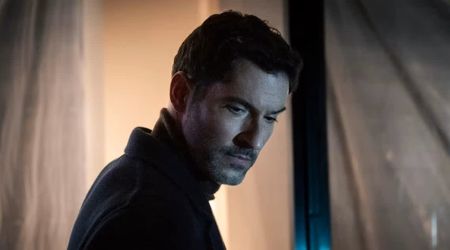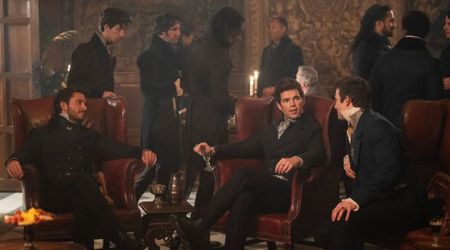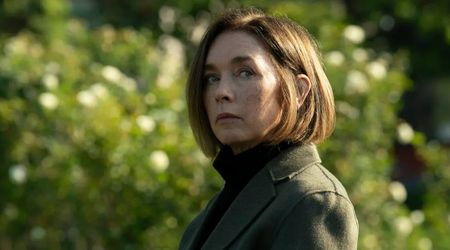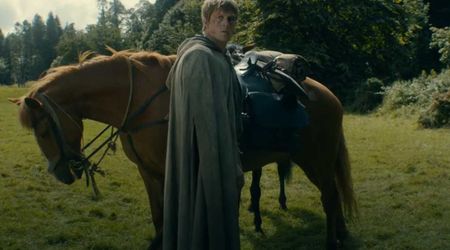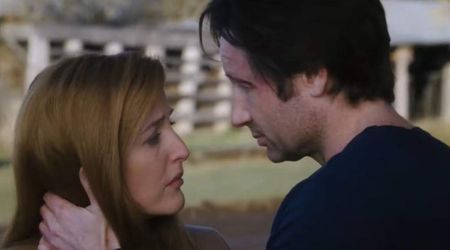'The Last Defense' builds the case for Julius Jones, the 19-year-old wrongfully condemned to death in Oklahoma

ABC's 'The Last Defense,' an investigative docu-series exploring controversial death penalty cases, turns its attention from Darlie Routier, the mother convicted of murdering her two sons, to Julius Jones in its second half, and explores how the 19-year-old was possibly framed for a crime he did not commit.
In 1999, Julius Jones was a member of the National Honor Society and had graduated from the John Marshall High School in Edmond, Oklahoma, with top honors. A model student, if there ever was one, he was the co-captain of the school's football, basketball, and track teams, and had been accepted into the University of Oklahoma on an academic scholarship. Born into a middle-class African-American family, Julius had an elder brother, Antonio Jamaal Jones, and a sister Antoinette Jones, and his life was looking on the up. But a cruel twist of fate and a betrayal from a friend made him the prime suspect in a murder, and eventually, condemned to death.
On July 28, 1999, Edmond insurance executive Paul Scott Howell was shot and killed in a carjacking gone wrong. His sister, who was the only witness to the crime, informed the police that the shooter was an African-American man who was sporting a red bandana and had approximately half-an-inch of hair sticking out from underneath his stocking cap.
Howell was a well-known member of the Edmond community, with neighbors attesting to his jovial demeanor and his willingness to help, no matter what the situation. His murder came as a shock to the city, which, to this point, was nothing more than a spectator to such violent crimes. His status as a middle-aged white man who had been mercilessly gunned down by a member of the so-called unruly black community gave it further visibility in the state, with Edmond police hard-pressed to track down the perpetrators as swiftly as possible.
Police soon discovered the stolen car abandoned in front of a supermarket. Detectives sounded out Kermit Lottie, a local chopshop owner who dealt in stolen vehicles and had served as an informant for the police department for a considerable amount of time, for leads. He said he had refused to pawn off the car because of the 'heat' on it following the murder, and pointed them in the direction of Ladell 'Day Day' King, a felon who had built a reputation for committing grand theft auto.
It was here that law enforcement began suspecting Julius in the crime. King told detectives that Chris 'Westside' Jordan and Julius Jones were the ones who were involved in the carjacking that night and that one of them pulled the trigger on Howell. Jordan was subsequently brought in and was given the incentive of escaping the death penalty if he cooperated and testified against Julius, a friend from high-school and college, a deal to which he agreed. Julius' fate had been sealed, without him ever realizing it.
Two days after the murder, Madeline and Anthony Jones, the parents of Julius, received a call from the police telling them that their middle child was the prime suspect in the shooting death of Paul Howell. A few moments later, police were at their door, guns drawn.
In an article from NewsOk in 1999, Madeline relived the incident. "They told us to leave the house and said they would shoot us if we went back in," she said. As the family was ushered out of the home, they were met with dozens of police officers in front, all pointing their guns at them. Julius, however, was not present, and because law dictated that they brandish a search warrant before conducting any search of the premises, it would be another six hours before detectives began combing through the residence. The evidence uncovered would doom Julius to the gallows.
As detectives ransacked the two-story Camelot Estates home at 12104 Greystone Terrace in search of the possessions that would tie Julius to the crime, Jordan, confined to the back of a police vehicle, apparently directed them to a hidden compartment in the teen's room. When pried open, they found a red bandana — which Howell's sister had identified the shooter to be wearing — and a gun, which proved to be the same weapon used to shoot the insurance executive. Julius was later found to be sleeping at the Pickwick Apartments at the residence of Laymon Jordan (Chris' brother) and arrested for the murder of Howell.
It was almost immediately clear that the prosecution would go for the jugular and seek the death penalty for Julius, especially considering how high-profile, highly-publicized, and racially charged the case was. The district attorney put in charge of prosecution was the infamous Bob Macy, who over the course of his career had sent 54 people to death row, more than any other District Attorney in the country.
When the trial began in 2002, the problems with Julius' defense almost immediately became apparent. Neither of his lawyers had any capital trial experience, which would go on to play a crucial role in his eventual conviction.
Because the sister was the only live witness, Jordan's testimony in front of the jury was paramount to the prosecution's case. However, his transcripts from his interviews with the police showed that he repeatedly changed his story and that there inconsistencies that seemed to suggest that he was the killer and not Julius. But detectives ignored the cues and instead steered him towards concocting a story against his friend, assuring him that he would escape with a plausible 30-year to life sentence for his role as an accomplice. He was released in 2014, having served just 15.
But Julius' lawyers failed to cross-examine Jordan on the stand for the six different and inconsistent statements he gave to the police after his arrest. They also failed to put on the evidence that would have proved Jordan was the actual shooter, and in fact, did not put a single witness on the stand — not even the parents and siblings, who would have testified that Julius had been at home having dinner at the time of the murder — during the guilt-innocence phase of the trial.
They also failed to show the jury a photograph of the 19-year-old, taken just a few days before shooting, illustrating that he had low, crew-cut hair, ruling him out as a suspect as per Howell's sister's admission.
These inadequacies combined with the already uncovered evidence, as well as video evidence that put Julius at the same supermarket where the car was recovered only a day after the murder, meant that the prosecution got the guilty verdict and the death penalty it was so zealously seeking.
The lingering feeling remained that Julius had been gamed by the justice system. That he was the 'sacrifice' needed to keep the proverbial beast content. There was far too much evidence that supported the case for his innocence that had so willfully been ignored; evidence that has since been presented to the courts during the appellate process but which was puzzlingly deemed inadequate.
The first was the failure of detectives to investigate Jordan as a possible suspect. Jordan frequently slept over at the Jones' northwest Oklahoma City home and was at the residence on the day after the murder with Julius' younger sister watching television, according to the family. He would have had every opportunity to stash away the bandana and the gun at the time.
Though that is mere speculation, there was also concrete evidence to support the argument. While in prison, Jordan reportedly bragged to inmates that he had committed the killing and that he was glad he had managed to pin the crime on Julius. Two of those inmates, neither offered any incentive whatsoever, testified that Jordan had confessed to the murder, but neither statements were considered valid or relevant by the appeals courts.
The jury also never heard the full extent of the benefits that the witnesses against Julius received as a result of their testimony, which is a requisite for a fair trial. Besides Jordan's early release, it came to surface that King had never been prosecuted in connection with a murder, despite his admitted involvement. He also received less than the statutorily mandated sentence for habitual offenders in connection with unrelated charges.
The selection process for the jurors has similarly been questioned on numerous occasions. Prospective black jurors, with the exception of one, were excluded from jury service on the grounds they had criminal histories. Yet, a white man who served had two prior felony convictions that the prosecution conveniently failed to disclose to the defense.
Then, in November 2017, Julius' current legal team discovered new evidence that proved at least one juror harbored racial prejudice that influenced his vote to convict and sentence Julius, with another juror even informing the judge that the juror confessed the trial was 'a waste of time' and 'they should just take the n***** out and shoot him behind the jail.' The U.S Supreme Court as unambiguously condemned racial prejudice from playing any role in a single juror's decision to convict a defendant and sentence him to death, yet an appeals court ruled that the evidence is insufficient to overturn the ruling.
The most damning case for him, however, will be the litany of accusations of bad conduct that piled up against Bob Macy in the years since. Prosecutorial misconduct was discovered in approximately one-third of his death penalty cases, with courts reversing close to half his death sentences. He was forced to retire in 2001 in the wake of a scandal involving a forensic scientist accused of falsifying evidence for his case.
In June 2016, Julius' lawyers filed a petition on his behalf with the Oklahoma Court of Criminal Appeals based on a study that was part of the report issued by the Oklahoma Death Penalty Commission. The report concluded that there were serious and systemic flaws in the state's capital sentencing system. It included one finding which read "homicides with white victims are most likely to result in a death sentence" and stated that criminal defendants like Julius who are accused and convicted of killing white victims are nearly two times more likely to receive a sentence of death than if the victim is non-white.
Then, in July, a motion filed with the Oklahoma County District Court demanded that the court order DNA testing on the bandana tied to the killing after repeated requests with Oklahoma County District Attorney David Prater to do the same fell on deaf ears. It's possibly Julius' last hope at exoneration.
The state of Oklahoma had suspended executions — which it conducted via lethal injection — after a botched attempt saw a prisoner suffer an agonizing death, but will resume them by the end of 2018 by means of Nitrogen gas. With Julius languishing behind bars to this day, and with the appeals process all but exhausted, it's possible that his date of execution is looming. His last hope remains a grant of clemency from Governor Mary Fallin, failing which the country faces the prospect of the blood of yet another innocent man on its hands.

